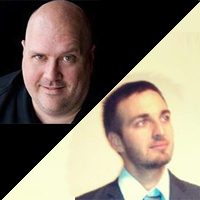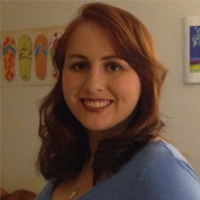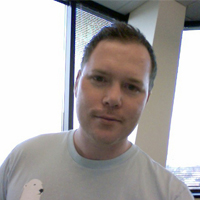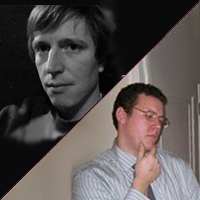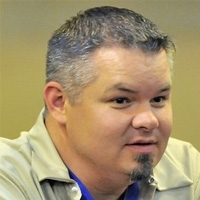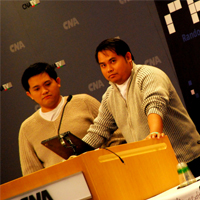2014 Sessions Bricks of Information
Cross-Platform Mobile Development with Titanium and the Appcelerator Platform
Mobile apps are becoming more and more important for business to roll into their development landscape. Cross-platform mobile development is commonly the best solution for many situations. Many frameworks have cropped up to solve these problems.
In this talk, we'll take a deep-dive into the Appcelerator platform. We'll take an in-depth look at the Titanium approach to solving this problem, as well as briefly touch upon native development and other technologies' cross-platform solutions and when each one may be appropriate to use. We'll also go over some best practices for Titanium development for the enterprise environment and take a tour through the Appcelerator tools.
- Speaker
- Vince Bullinger
- Room
- TBD
Integrate and connect with Microsoft Service Bus
Microsoft's Service Bus offers both on-premises and cloud solutions for your application integration needs. It also makes connecting real-world devices and sensors to your applications a breeze. We will demonstrate an end-to-end cloud based messaging solution and outline how we use Service Bus to meet our Enterprise Application Integration needs at Marshfield Clinic Information Services.
- Speakers
- Brett Jensen & Adam King
- Room
- TBD
Improving Performance in .NET Applications
We all want to write fast code. But writing code that performs well doesn't come for free. Developers must be cognizant of what their code will do when it is executed, and what tools to use when you want to find the hot spots. In this session, we'll cover what a .NET developer needs to know to improve the performance of their applications.
- Speaker
- Jason Bock
- Room
- TBD
Supercharge Your Unit Testing Using Groovy and Spock
Geared toward Java developers, this talk presents an approach to unit testing that is highly expressive, elegant and clean. The Spock framework builds on the classic unit testing power of JUnit and leverages the dynamic power of the Groovy language. Because Groovy and Spock run on the JVM, they integrate seamlessly to test code written in Java and other JVM languages. This presentation will feature a quick intro to the power of Groovy, give a high-level overview of the Spock framework, then dive into the nuts and bolts of writing tests with Spock. This will incorporate both static examples and live coding, with plenty of opportunities for questions. Want to strengthen your testing skills? Want to have fun writing good tests? Spock and Groovy offer all the power you need without the pain.
- Speaker
- Brian Stewart
- Room
- TBD
Meet Elixir
Elixir is a new functional programming language based on the Erlang virtual machine, and it'll make you start thinking about programming in a completely new way. In this session I'll introduce some of the concepts of Elixir while writing some beginner-level programs. We'll explore Elixir's powerful pattern matching syntax and other features as we write programs free of loops, mutable variables, and "IF/ELSE" statements.
If you're a newbie to programming, you'll love this talk. And if you're an experienced developer, get ready to feel like a complete newbie again. Either way, it'll be a blast!
- Speaker
- Brian Hogan
- Room
- TBD
Going The Extra Mile With Entity Framework Code First
Entity Framework Code First is a breeze to get up and running, but are you taking advantage of some of the more advanced features? Are you getting caught up by common pitfalls? In this presentation, we'll review the history of Entity Framework and the status of the project. We'll cover some core functionality concepts and asynchronous queries. Mike will show how to use StructureMap to easily maintain the lifetime of the DataContext. We'll look at how we can leverage the Projection functionality of AutoMapper to easily write optimized queries. Finally, Mike will demonstrate EF Migrations and how you can tie it into your current continuous integration environment. This presentation assumes you have some knowledge of Entity Framework so we'll try to not get caught up in the basics.
- Speaker
- Mike Cole
- Room
- TBD
Do More With Less: Get Groovy
Chances are, if you've written any Java code, you've written a lot of Java code. If you've ever found yourself reeling with deja-vu from writing the same boilerplate Java code over and over, maybe it's time to consider a better way. Come and learn how the Groovy programming language provides simpler solutions for common problems, and smooths out a lot of the wrinkles that we all encounter in Java.
- Speaker
- Jonathan Kelly
- Room
- TBD
File --> New --> SideWaffle!
Have you ever wanted to get into Visual Studio Extensions to help automate building new projects? Sidewaffle is an open-source Visual Studio extension that lets you create your own templates using your own code without modifications. You'll learn how to create Project and Item templates from your existing codebases. File-New-Project your way to personal and professional efficiency.
- Speaker
- Carl Schweitzer
- Room
- TBD
Developing for Google Glass
Is Google Glass going to be a part of our future? This raises many questions and some very strong opinions. Although they may not be fully ready for the general consumer, there are many scenarios where Google Glass can provide incredible value. This includes many business uses. Glass is a whole new world of development with simultaneously many limitations and advanced capabilities. The developer and user experience is very different than anything we have typically seen before. We will discuss the potential uses of glass, and then what the designer and developer stories look like. Code examples will be using Xamarin and C#, most of the concepts apply equally to Xamarin or native Android development.
- Speaker
- Tim Miller
- Room
- TBD
Simply MVC
The MVC pattern is an excellent way to implement the Separation of Concerns principle in web applications. However, the patten itself is incomplete; resulting in many different interpretations. Here we will examine the core of the MVC pattern and examine why variations have appeared.
- Speaker
- Ben Anderson
- Room
- TBD
Gr8Workshops
The advent of code schools like Hacker School and the FlatIron School as well as weekend courses such as Code Camps and Rails Bridges has changed the way that programming is taught. As the demand for developers continues to increase, the programming community should consider alternative teaching approaches to fill the increasing demand particularly in the recruitment of diverse candidates. One of the main objectives of the Gr8Workshops initiative (and theGr8Ladies organization) has been to provide free or low-cost basic introductory courses for both junior to mid-level programmers and non-technical participants in a warm, welcoming environment. The experiences from the last year have provided insight into how we have approached the subject of teaching Groovy and Grails to other nontraditional groups. The first 30-40 minutes of this session will be a presentation of helpful hints and lessons learned from the first year of the Gr8Workshops and Gr8Ladies education series. The talk portion will be followed by a guided discussion of current teaching methods.
- Speaker
- Jennifer Strater
- Room
- TBD
Five Design and Development Techniques That Make Your Life Easier
What are the ideas that make the most difference in your software development? How do you organize your code? When can (and should) process be considered data, and vice versa? When is it helpful to invert the traditional way of implementing modular behavior? I present five design and development ideas that have helped me (and that I have taught to software engineering students at UWEC.) I'll also ask you to tell me and the other attendees about the ideas that have helped you - bring your design and architecture patterns, programming idioms, favorite framework ideas, and other development/design ideas. We'll generate a list that can be of help to all of us.
- Speaker
- Dr. Paul J. Wagner
- Room
- TBD
Stylesheet Design Patterns for Better CSS
Don't think of pattern images or UX design patterns; we will be discussing strategies for tackling common problems in CSS development. SAAS and lean proof-of-concepts require different strategies, but both should have styles that are scalable and maintainable.
We'll call out anti-patterns in our stylesheets and look at patterns from the community. We'll talk about selectors and media queries and learn about preprocessors. Having these patterns and insights in your toolkit will allow you to make choices that produce better CSS that scale like a boss.
- Speaker
- Josh Renner
- Room
- TBD
Parenthood for the IT Professional: Raising A Family of Geeks
Teaching you to teach your kids how to begin coding awesome apps for fun, providing ideas and basics in JavaScript, Scratch, and Elixir. It's not an easy task, and these two have ideas they'd like to discuss with you on how to maximize the potential for your children to learn how to program.
- Speakers
- Mitch Bullard & Alex Henry
- Room
- TBD
Write XBOX ONE, Windows and Windows Phone Apps The Universal Way
With Universal Apps, Microsoft has introduced a convergence for developing apps for their platforms. Having a common development model with WinRT, the developer's campfire dreams of one-hundred percent reusability take a step closer to reality, but that is most likely an unreachable goal.
Come learn how universal apps work; the good, the bad and the ugly of using them. Greg will also discuss how to customize the user experiences for each platform to provide the best apps to your users. He will go through several examples so that you can walk away with a solid foundation and avoid common pitfalls.
- Speakers
- Greg Levenhagen
- Room
- TBD
Portable Libraries Will Rock Your Socks Off In Mobile Development
Portable class libraries are powerful and can help speed up your mobile development. You can use these on Windows Phone, Windows 8, Xamarin Android, and Xamarin iOS applications. We will go over how to create them, and best ways to use them. We will also show demonstrations using Xamarin Studio along with Visual Studio. Write code once, kind of deploy everywhere?
- Speakers
- Min & Lwin Maung
- Room
- TBD

